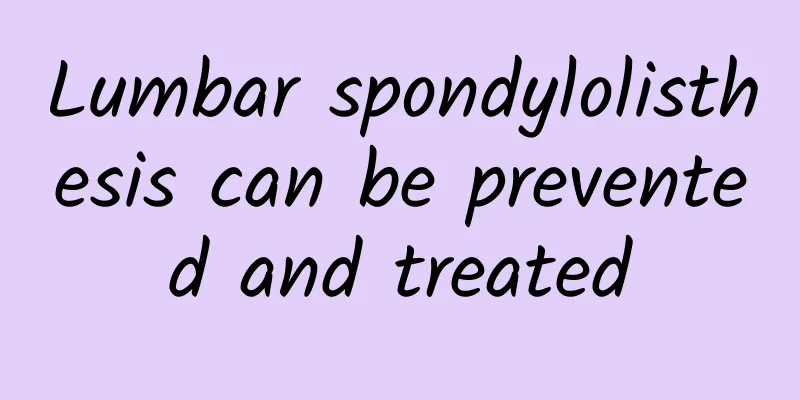Lumbar spondylolisthesis can be prevented and treated

|
As the name suggests, lumbar spondylolisthesis means that the upper lumbar vertebra has moved relative to the next lumbar vertebra, usually forward, but rarely backward. Divide the vertebral body of a vertebra into four equal parts from back to front. If the vertebra slides one quarter relative to the other, it is a 1-degree slip, and if it slides completely, it is a 4-degree slip. There are five segments of the lumbar spine, and each segment may slip. The fifth lumbar vertebra at the bottom may slip relative to the sacrum. The causes of lumbar spondylolisthesis include both congenital and acquired factors. Congenital causes are developmental problems. For example, spina bifida or spondylolysis are caused by incomplete development of the bones of the spine, which are naturally not strong enough. As age increases and weight increases, the ligament structure becomes loose, and the spinal joints shift due to gravity, causing slippage. The most common ones are caused by acquired factors, such as bending over and carrying heavy loads for a long time, or sudden violent injuries, or strain leading to the tearing of the ligaments and joint capsules that constrain the vertebrae, rupture of the intervertebral discs that connect the vertebrae, and even fractures of the bones in the isthmus of the vertebrae, which can all lead to lumbar spondylolisthesis. In the early stage of lumbar spondylolisthesis, symptoms manifest as soreness and pain in the lumbosacral region, especially when bending over or bearing weight. Straightening up and tapping the lumbosacral region with fists can relieve the symptoms. As the disease progresses, it will compress the nerves that control the lower limbs, causing pain in the knees and hips, which can be easily misdiagnosed as hip or knee joint diseases. Some symptoms manifest as pain along a line on the back or outside of the thigh or calf, and may also be accompanied by numbness in the feet. Severe cases make it difficult to walk, and both hands cannot hold weight. Most mild cases of lumbar spondylolisthesis can be cured with traction, massage and systematic conservative treatment. Only some severe cases require surgical treatment. Patients with lumbar spondylolisthesis should pay attention to self-protection, sit properly, and avoid sitting for long periods of time and bending over for long periods of time. When the waist is uncomfortable, stop the work at hand in time, rest and seek appropriate treatment. You can also insist on doing waist and back muscle exercises 1-2 times a day, 10 minutes each time, which will have obvious effects. Exercises include "Little Swallow Flying", five-point support and "Wind-swaying Lotus Leaf". (Li Wuqiang, Director and Chief TCM Physician of Sanmenxia Wuqiang Traditional Chinese Medicine Hospital) |
<<: Children with poor attention span, rehabilitation therapy can help you
>>: Be careful! A "cold" may be fulminant myocarditis
Recommend
What are the procedures for induced labor?
In fact, for female friends, the physical and men...
Is it reliable to use Fuel Treasure to restore the car's fuel economy and power? Why does the car lack power and increase fuel consumption?
Cleaning additives have a certain effect in remov...
How to distinguish whether a humidifier is good or bad? How to disinfect a humidifier
Humidifiers can increase the humidity of the air....
Postmenopausal hormone replacement therapy
With the increase of human life expectancy, the p...
Can I get pregnant if I have artificial urticaria?
Artificial urticaria is a very common skin diseas...
Why do my farts smell so bad after pregnancy?
In the early stages of pregnancy, pregnant women ...
How to slice fish without it falling apart?
Fish filleting is a common way of eating in many ...
10 tips for treating heartburn during pregnancy
Pregnancy is actually a very difficult process, b...
Can Baofukang suppository be used during menstruation?
With the continuous improvement of our current ma...
How to cook fish maw stewed with Gorgon fruit and Chinese yam? How to cook fish head stewed with Gastrodia elata?
Fish stew is not only delicious and cheap, but al...
Amniotic fluid present at 11 weeks of pregnancy
Pregnancy is a very important thing for women. Fr...
What are the dangers of wearing short skirts in early spring?
Spring is here, and girls on the street who prefe...
Is it normal to bleed after an abortion?
Many female friends will experience bleeding afte...
Why do I feel more energetic after staying up late?
This article was reviewed by Zhao Wei, deputy chi...
Can I eat mangoes while breastfeeding?
Mango is a fruit mainly produced in countries suc...









